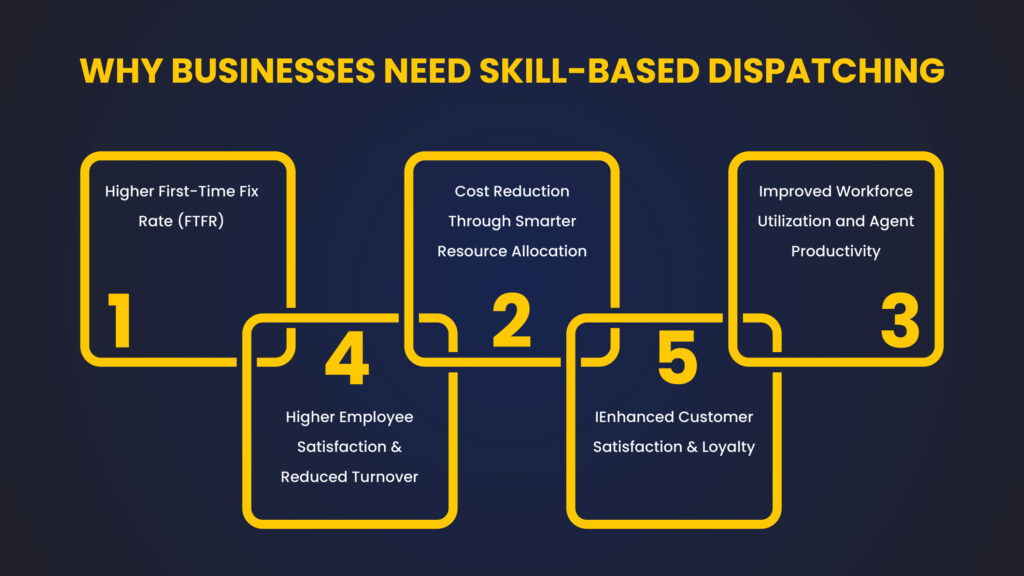Imagine your kitchen sink gets blocked, and you call the plumber to help. If they do a great job, you’ll call them again and recommend them to others.
That’s how customers feel about businesses. 61% of Millennials will even pay extra for good service. But it’s not just a Millennials thing. 89% of all customers will make another purchase if they get excellent customer service the first time. These two statistics show that customers will likely spend more on excellent service regardless of age.
In field service dispatch, the best way to keep customers happy is to send the right worker with the right skills for each job. Sadly, many companies don’t understand. Let’s learn about skill-based dispatching and how it can help your business.
The Challenges of Poor Job Matching in Field Service
Field service organizations (FSOs) help customers handle operational tasks in service areas. Tasks include scheduling, managing work orders, dispatching, and ensuring everything runs smoothly. Since dispatching is a big part of FSM directly connected to customers, you must use the process to gain customer trust and secure repeat business.
Unfortunately, many companies overlook workforce management by skill or dispatch workers using outdated data—which can hurt business. Before discussing skill-based dispatching, let’s see how inefficient dispatching negatively impacts customer experiences, workforce productivity, and financial performance.
What Happens Without Dispatching By Skill?
- You’ll have lower first-time fix rates because sending unqualified workers decreases the number of jobs completed.
- When customers get frustrated by poor service, they leave bad reviews and switch to competitors.
- Assigning the wrong technicians to jobs they’re not skilled for inevitably leads to wasted resources. For instance, when a plumber can’t fix a company’s HVAC system, the customer has to wait longer, and your team wastes time and finances on return visits.
You need proactive skill-based dispatching to save time, improve field service efficiency, and keep customers happy.
“An Aberdeen Group study shows that companies with over 70% first-time fix rate retain 86% of their customers, while those below retain 76%.”
Why You Should Use Skill-Based Dispatching to Optimize Job Matching
When you use skill-based dispatching, dispatchers assign tasks to technicians based on specific skills, qualifications, certifications, and experience in particular equipment or procedures. It’s the best way to get the most qualified hands on each job.
Let’s look at examples for better understanding.
Skill-based assignments in contact direct customer support call to agents with the language skills and/or technical expertise for the call. In logistics, dispatch will assign field workers to routes or work orders that match their experience and qualifications. For instance, hazardous goods should be for drivers whose Commercial Driver’s Licenses have a HazMat endorsement.
How Skill-Based Dispatching Works
The first step is assessing individual skills, experience, and qualifications. Next, you do skill matching, assigning jobs to the individuals with the most relevant skills and expertise. Dispatchers can also use real-time data to decide who gets which task.
Why Your Field Service Business Should Be Matching Skills to Jobs
There’s no better way than assigning customer requests to the most qualified individuals. Optimizing job matching minimizes delay, provides good service, and increases efficiency.
Likewise, you’ll be able to manage large, geographically dispersed workforces with real-time data on field workers’ skills, certifications, qualifications, competencies, and work experience.
Identifying and Categorizing Skills for Skill-Based Dispatching
Besides a slash in operational costs, you have more reasons to use scheduling and dispatch software. This article highlights those benefits alongside the key features dispatch management software should have. That way, you can choose the best software for your business.
Now that you understand how skill-based dispatching works, you should learn to identify the skills FSOs want. The two (2) major categories of skills critical to workers in field service organizations (FSOs) are soft skills and hard skills.
Soft skills are personal qualities that affect how individuals interact casually and professionally with others. They include empathy, communication, and problem-solving. On the other hand, a hard skill is a specific ability or knowledge a person learns and acquires to perform a particular job or task.
Field workers need a good blend of both skills because hard skills like knowing dispatch software complement soft skills like communication.
Soft Skills You’ll Need in Dispatch
1. Communication
Communication in dispatch is beneficial when interacting with customers (especially if they’re panicking) or team members (especially when giving instructions) because you must be able to relay information accurately. By extension, language is also a key part of communication and a deciding factor when assigning workers.
2. Multitasking and Problem Solving
Teams often need to respond to multiple customer requests simultaneously. Field service agents need this skill to adapt, decide, solve problems, and handle multiple tasks efficiently and accurately.
3. Stress Management and Emotional Resilience
Like every stage of field service management, dispatching can test your mind and body. This skill will help you stay calm, collected, and focused at work.
4. Empathy
Field service agents always deal with people, including colleagues, other businesses, customers, and stakeholders. Someone with empathy will handle every situation with care and ensure that others feel heard and valued while receiving support.
Matching jobs with skills means identifying field workers with these specific skills and assigning the request to one of them. For example, when a Spanish manufacturing company inquires about machine repairs, the assigned technician must know manufacturing, machine repairs, and Spanish.
Hard Skills in Dispatch
Besides soft skills, field service teams need technical, concrete, and specific abilities often obtained from years of formal training or practical experience. Here are some hard skills that are good enough for you:
1. Field Expertise
A worker who understands their job, including the company’s services, products, and industry, will provide better customer service than others who don’t. More experience, fewer mistakes.
2. Knowledge of Preferred Dispatching Software
Field service workers need specialized software to track workers, schedule jobs, and manage resources. The software and automation features are the only way to do your job effectively and efficiently.
3. Detailed Geographic Knowledge of Service Area
This hard skill is native (most common) to scheduling and dispatch. Teams must know the geography of service areas, including the roads, streets, towns, cities, landmarks, and general terrain. It helps dispatchers with route optimization and makes work easier for field workers.
4. Data Entry
While automation is the goal, field workers and dispatchers must input data such as dispatch details, availability, schedules, or feedback into field service software. Hence, quick and accurate data input is necessary to avoid inefficiencies.
5. Understanding of Policies, Procedures, and Protocols
Work management goes beyond completing dispatch orders. As a field worker, you must know your organization’s operating standard procedures, policies, and protocols. Teams must learn about regulations guiding appropriate conduct on and off work for order, compliance, and better decision-making.
The ideal option is to acquire both skill categories. Remember, combining soft skills and specialized knowledge will give any field service agent an edge in the competitive market and make them a valuable asset. It’s also what companies look for when hiring.
“Skill-based dispatching serves dispatchers, employees, and leaders across the organization, including customers.”
Using Software for Skill-Based Dispatching
At its core, skill-based dispatching with software is more than automating job assignments based on technician expertise, certifications, and experience. Instead of dispatching based on availability alone, modern software like Swivl evaluates a worker’s qualifications in real time and assigns jobs accordingly.
For instance, if a customer needs a commercial HVAC repair, the system won’t just send the closest technician. Software like Swivl will assign the one with the proper certification and track record of handling similar maintenance. This level of precision is what your FSO should aim for.
How Software Transforms Skill-Based Dispatching
Here’s a rough, step-by-step overview of how your company can use skill-based dispatching software:
-
- Identify the ideal skill set for every service category: Since every service category needs specific expertise, the software first sorts jobs based on technical needs, safety requirements, and operational factors.
-
- Record skills and competencies of your workforce
The software records field workers’ certifications, such as OSHA 30 (for handling flammable and combustible liquids) and NFPA 70E (for electrical installations in residential, commercial, or industrial settings), in a centralized database. It also updates technician profiles to reflect customer ratings, first-time fix rates, and task completion times. For example, if a worker completes 50+ solar inverter installations, their profile automatically reflects their growing expertise.
-
- Assign tasks to service agents in real-time based on real-world factors
When a service request comes in, the system matches the job to the best technician available based on technical expertise (HVAC, plumbing, electrical repairs), certifications (NFPA 70E, OSHA 30), location, availability, language proficiency, or any factor your company chooses.
Why Use Software for Skill-Based Dispatching?
Dispatching by skill is a more brilliant way to run your field service business because it’s more than mere automation.
1. You Can Manage Resources and Match Technicians Better
Dispatch software uses algorithmic matching for job requests to ensure technicians are assigned based on real-time factors like location, expertise, and workload. A technician’s schedule changes and real-time updates instantly adjust assignments. This level of automation doesn’t stop at automation; it optimizes it for fewer errors, fewer callbacks, and more satisfied customers.
2. Centralized Skills Management for More Accuracy
One of the biggest dispatching challenges is tracking technician skills. Without a centralized system, data on certifications and experience can be outdated or scattered, leading to inefficiencies. Software like Swivl could automate skills data collection and validation to store and update certifications, training history, and performance metrics in real-time.
3. Scale, Grow, and Get Competitive Advantage
Field service isn’t static because businesses keep evolving. As companies grow, managing a larger workforce and complex scheduling becomes more challenging. When this happens, let automation take the wheel.
Technology is a force multiplier. Whether you’re managing full-time employees, contractors, or a mix of both, choosing workforce management by skill is smart. It triples efficiency, profits, and competitive advantage.
4. Satisfy Customers Better
Customer service is the whole idea of FSM. In dispatch, you want to ensure field workers complete jobs done faster and more accurately. Experts would provide this and handle tasks correctly the first time, leading to fewer delays. It’s a plus if you can communicate to the client how qualified the technician(s) are on the job.
Overall, the whole idea is to get customers to trust your service. When they do, they stay loyal. That means more repeat business and higher lifetime value for each customer. Choose software.
Why Businesses Need Skill-Based Dispatching

Wherever you are in the field service business, whether you run a contact center, a dispatch team, or an entire company, workforce management by skill will make a difference for you. Doing this via software increases the chances that the right person with the right skills gets the job.
Besides the obvious benefit of enhancing first-time fix rates and improving customer experiences. Here’s a detailed analysis of the valuable benefits optimized job matching gives your company:
1. Higher First-Time Fix Rate (FTFR)
FTFR is a key performance metric in field service that measures how often technicians resolve issues on their first visit without requiring a follow-up. A higher FTFR means fewer return visits, happier customers, and lower operational costs. However, low FTFRs lead to excessive travel costs, repeat service calls and frustrated customers.
2. Cost Reduction Through Smarter Resource Allocation
Every extra mile traveled and every additional work hour adds to operational costs. Skill-based dispatching helps you cut unnecessary expenses. Businesses implementing skill-based dispatching reduce dispatch costs and improve profit margins without sacrificing service quality.
3. Improved Workforce Utilization and Agent Productivity
When workers are assigned tasks that match their expertise, idle time drops, and job completions increase. This method also boosts technician productivity because technicians can focus on their strengths without getting bogged down with misassigned jobs.
4. Higher Employee Satisfaction & Reduced Turnover
The previous benefit highlighted spills into this one. Employee retention is as necessary as customer retention. When technicians are assigned tasks that match their expertise and skill level, they feel more confident and capable. A happy workforce is more productive and loyal.
5. Enhanced Customer Satisfaction & Loyalty
Customer satisfaction means business success. When customers can rely on your business for fast, efficient, and expert service, they stay loyal, which is the key to long-term growth.
Let’s reiterate essential points so they sink in. How well businesses match technicians to jobs directly impacts efficiency, cost reduction, employee satisfaction, and customer loyalty. Skill-based dispatching is the foundation of a more competent and efficient field service operation.
Are you ready to make the switch?
Implementing Skill-Based Dispatching in Your Business
Skill-based dispatching might sound complex, but the right FSM software, like Swivl, makes it effortless and highly beneficial. Whether you run a small business trying to maximize resources or a large enterprise managing operations, you can use Swivl without disrupting daily operations.
You’ll have access to intuitive dashboards and user-friendly interfaces that allow dispatchers to match jobs to skills easily. Likewise, there’s no steep learning curve, and employees can quickly adapt with minimal training.
Best Practices for a Smooth Integration
-
- Identify operational issues and ensure the FSM solution aligns with your business needs.
- Pick an integration-friendly platform like Swivl that works with your current software stack. Use consistent and accurate skills tracking across all platforms.
- Train your employees and provide support to encourage smooth adoption.
Industries that rely heavily on skill-based dispatching include telecommunications (which requires skilled technicians), utilities (which needs reliable response teams), and manufacturing (which requires specialized expertise for maintenance).
If you’re looking to simplify dispatching while improving service quality, dispatching by skill is the way forward.
Optimizing Field Service with Skill-Based Dispatch
Using software isn’t a mere upgrade; it’s the future of field service. Your business will improve when the right technicians with the right skills handle every customer request. Swivl has FREE features that’ll help you organize dispatch orders, assign them to the right agent, and—most importantly—ensure your business runs smoothly.
You can get a Book a Demo to test this out. You don’t need to add your credit card details. Just sign up and see the difference Swivl can make.




